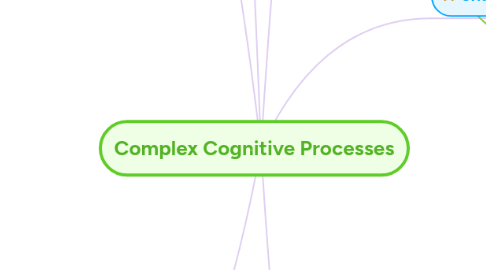
1. Procedural knowledge
2. Production deficiencies
3. Metacognition
3.1. Declarative knowledge
3.2. Procedural knowledge
3.3. Self-regulatory knowledge
4. Learning Strategies
4.1. Planning and focusing attention
4.1.1. Examples: setting goals, underlining, highlighting, skimming
4.2. Organizing and remembering
4.2.1. Creating organizational charts, flowcharts; using mnemonics, imagery
4.3. Comprehension
4.3.1. Concept mapping, summarizing, outlining, note-taking
4.4. Cognitive monitoring
4.4.1. Making predictions, self-questioning, self-testing
4.5. Practice
4.5.1. Using part practice and whole practice
4.6. Application
4.6.1. Appropriate tasks
4.6.2. Valuing learning
4.6.3. Effort and efficacy
5. Problem Solving
5.1. Identifying the problem
5.1.1. Carefully consider the nature of the problem
5.2. Defining goals and representing the problem
5.2.1. Focus attention on relevant information
5.2.2. Understand the words of the problem
5.2.3. Activate the right schema to understand the whole problem
5.2.3.1. Direct instruction
5.2.3.2. Worked examples
5.3. Exploring possible solutions
5.3.1. Algorithms
5.3.2. Heuristics
5.3.2.1. Means-end analysis
5.3.2.2. Working-backward strategy
5.3.2.3. Analogical thinking
5.4. Acting and evaluating
5.4.1. Anticipate consequences of acting on the selected solution
5.4.2. After implementing, seek evidence that confirms or contradicts the solution
5.5. Factors that hinder problem solving
5.5.1. Functional fixedness
5.5.2. Response set
5.5.3. Problems with heuristics
5.5.3.1. Availability heuristic
5.5.3.2. Belief perseverance
5.5.3.3. Confirmation bias
5.6. Expert knowledge
5.6.1. Knowing where to focus attention
5.6.2. Memory for patterns and organization
5.6.3. Acquiring a large store of domain knowledge
5.6.4. Spending ample time analyzing and planning
5.6.5. Monitoring progress and performance
6. Creativity and Creative Problem Solving
6.1. Assessment
6.1.1. Convergent thinking
6.1.2. Divergent thinking
6.1.2.1. Originatlity
6.1.2.2. Fluency
6.1.2.3. Flexibility
6.2. Sources
6.2.1. Restructuring ability
6.2.2. Diversity / Multi-cultural exposure
6.3. Encouraging creativity in learning environments
6.3.1. Interaction with others
6.3.2. Brainstorming
7. Critical Thinking and Argumentation
7.1. Teaching critical thinking in specific subjects
7.1.1. Sourcing
7.1.2. Corroboration
7.1.3. Contextualization
7.2. Argumentation skills
7.2.1. Open-minded and considers alternatives
7.2.2. Attempts to be well-informed
7.2.3. Appropriately judges the credibility of sources
7.2.4. Identifies conclusions, reasons, and assumptions
7.2.5. Judges well the quality of an argument
7.2.6. Can develop and defend a reasonable position
7.2.7. Inquisitive; clarifies information
7.2.8. Formulates plausible hypotheses
7.2.9. Defines terms in appropriate context
7.2.10. Draws conclusions when warranted, but with caution
7.2.11. Makes decisions by applying all characteristics listed above
7.2.12. Metacognitive knowledge and skills for argumentation are learned through instruction and over time
8. Transfer
8.1. Mindful abstraction is the key to thoughtful transfer
8.2. Types
8.2.1. Direct application
8.2.2. Preparation for future learning
8.3. Positive transfer
8.3.1. Occurs through overlearning
8.3.2. Foster teaching-learning environments using design principles
8.3.2.1. Support constructive learning processes in all students
8.3.2.2. Encourage development of student self-regulation
8.3.2.3. Involve interaction and collaboration
8.3.2.4. Learners should deal with problems that have personal meaning for them
8.4. Negative transfer
8.5. Stages of transfer development
8.5.1. Acquisition phase
8.5.2. Retention phase
8.5.3. Transfer phase
